Unit 10 I've had this bike for three years. 现在完成时态 课件(共26张PPT)
文档属性
| 名称 | Unit 10 I've had this bike for three years. 现在完成时态 课件(共26张PPT) | 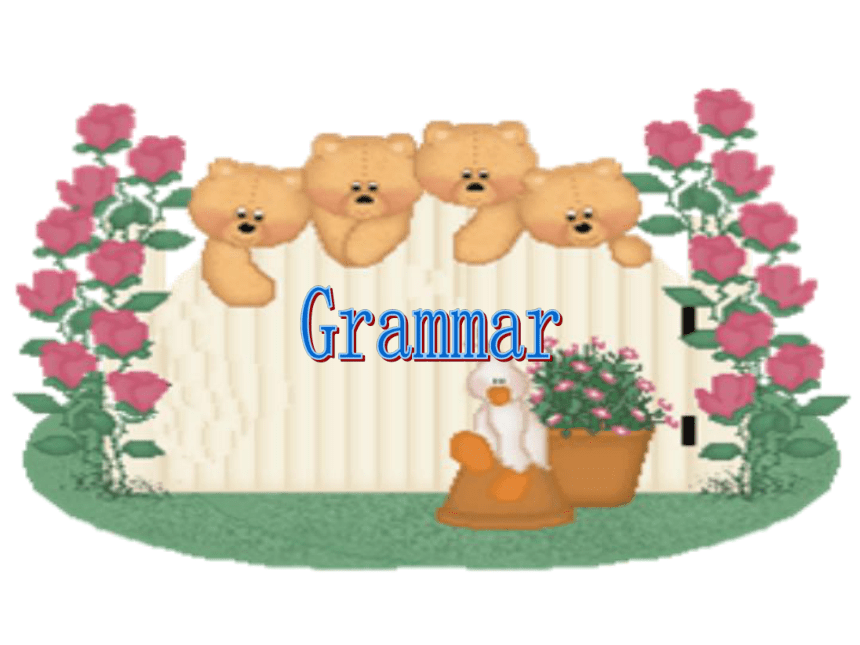 | |
| 格式 | pptx | ||
| 文件大小 | 773.9KB | ||
| 资源类型 | 教案 | ||
| 版本资源 | 人教新目标(Go for it)版 | ||
| 科目 | 英语 | ||
| 更新时间 | 2022-04-14 11:15:00 | ||
图片预览

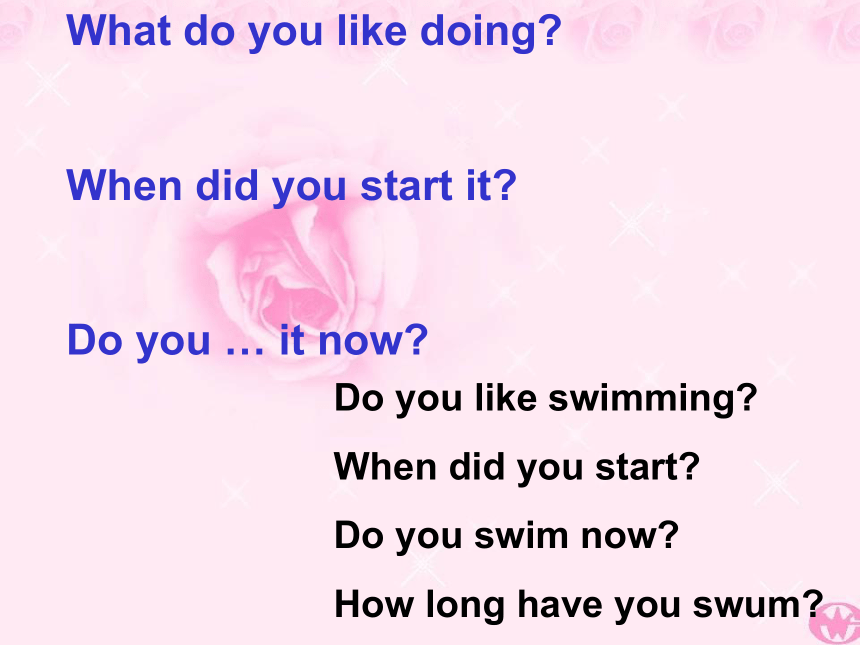
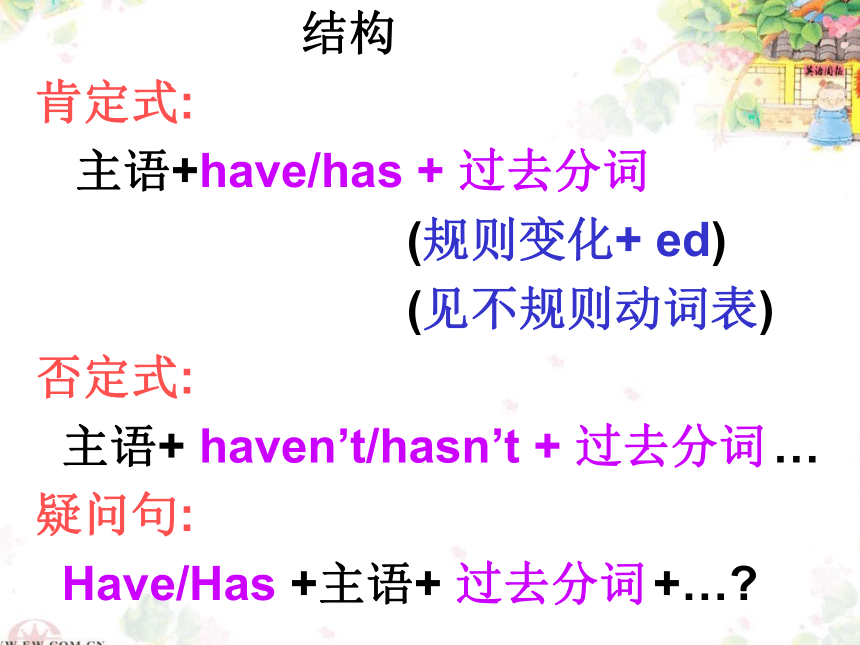
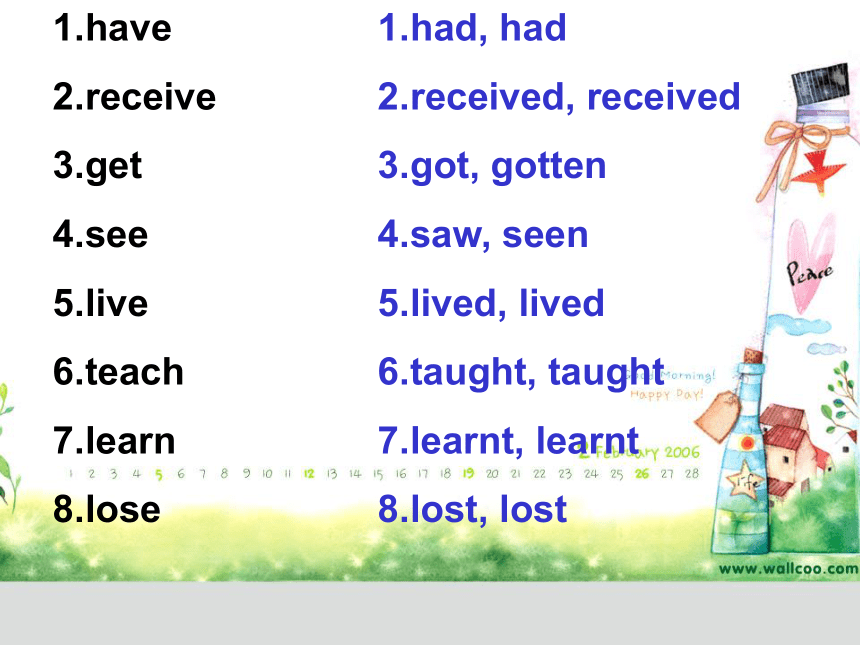
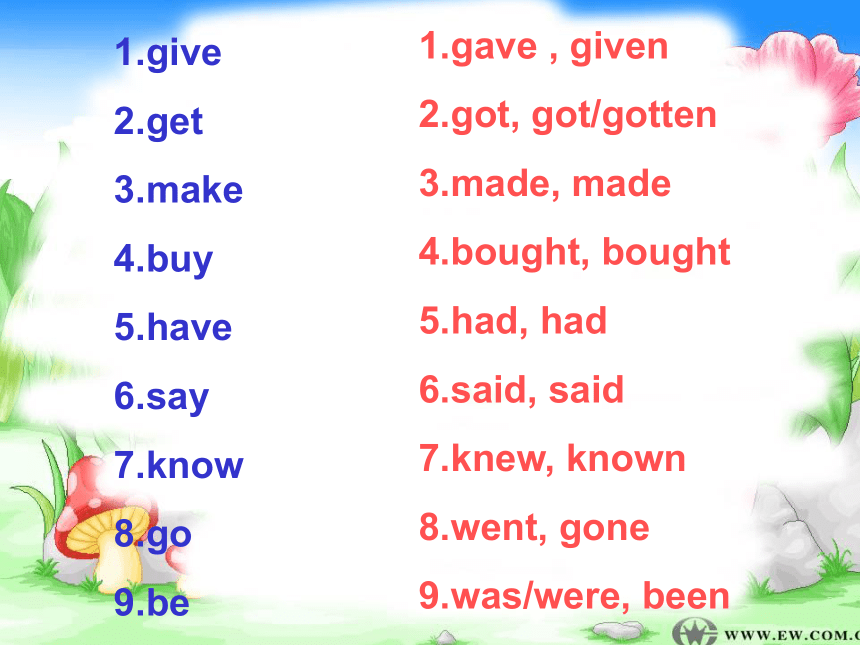
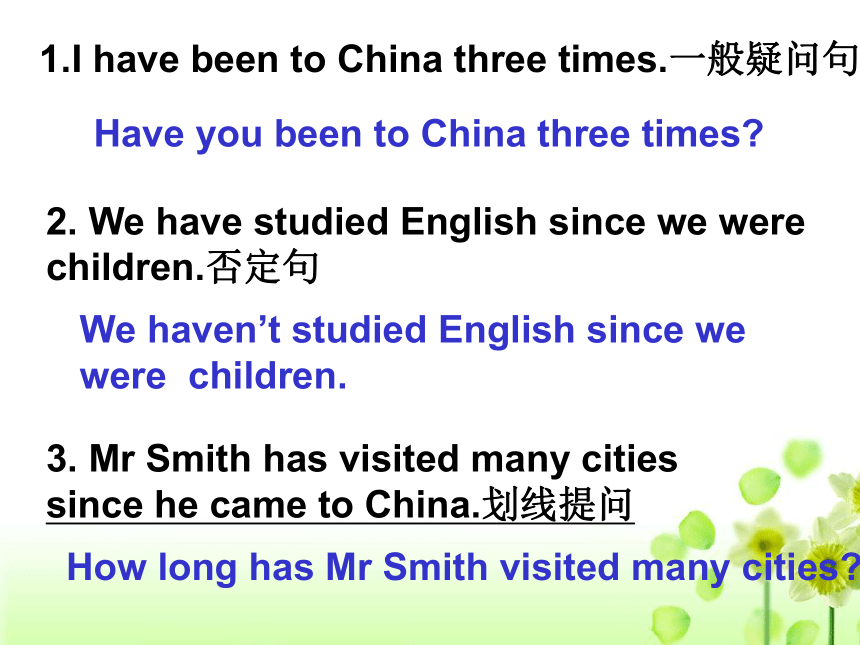
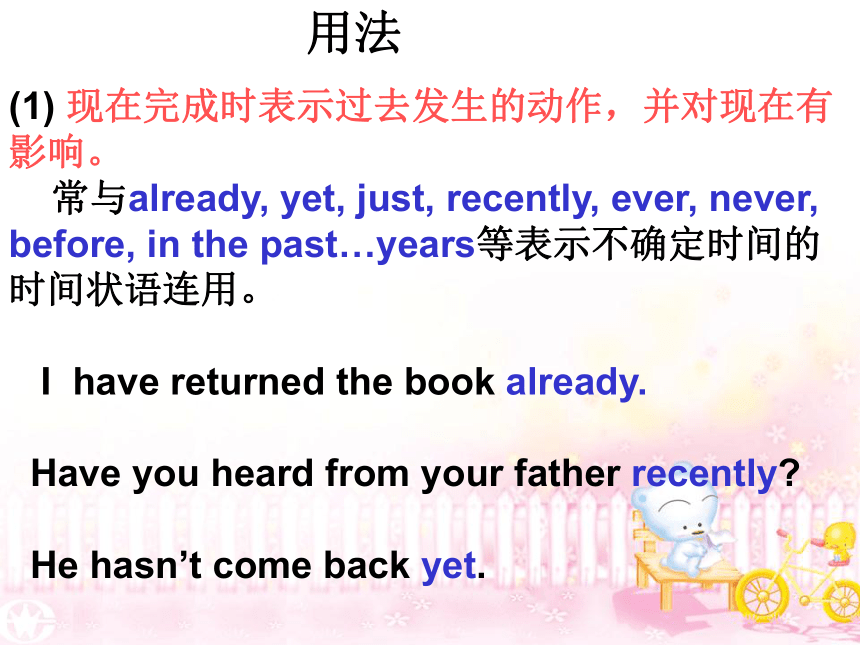
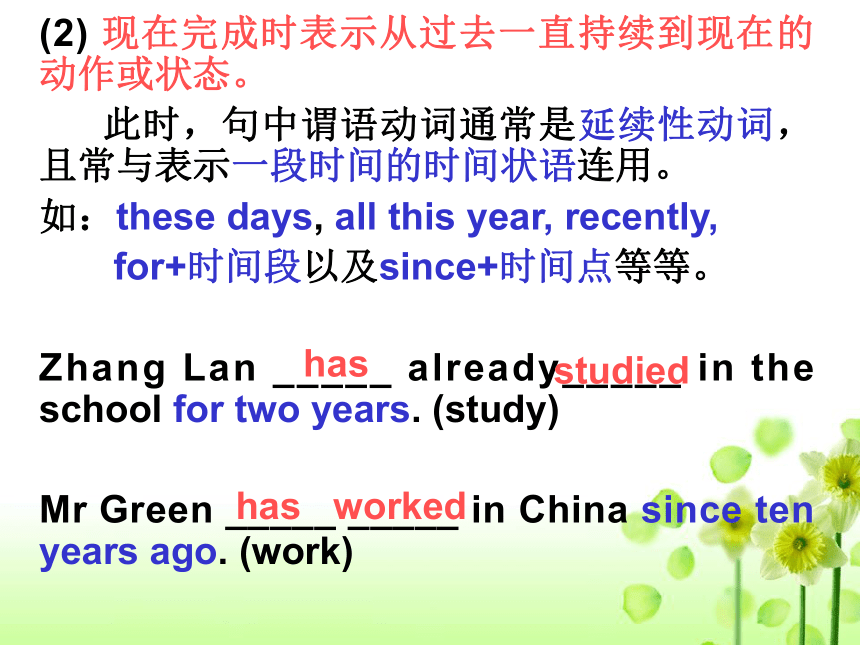
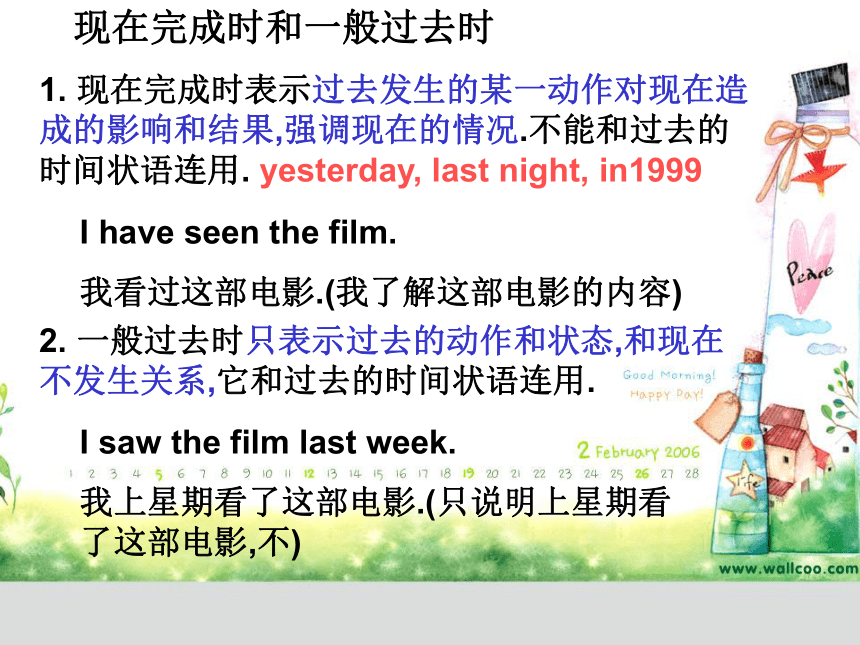
文档简介
(共26张PPT)
Grammar
What do you like doing
When did you start it
Do you … it now
Do you like swimming
When did you start
Do you swim now
How long have you swum
结构
肯定式:
主语+have/has + 过去分词
(规则变化+ ed)
(见不规则动词表)
否定式:
主语+ haven’t/hasn’t + 过去分词 …
疑问句:
Have/Has +主语+ 过去分词 +…
have
receive
get
see
live
teach
learn
lose
had, had
received, received
got, gotten
saw, seen
lived, lived
taught, taught
learnt, learnt
lost, lost
give
get
make
buy
have
say
know
go
be
gave , given
got, got/gotten
made, made
bought, bought
had, had
said, said
knew, known
went, gone
was/were, been
I have been to China three times.一般疑问句
2. We have studied English since we were children.否定句
3. Mr Smith has visited many cities since he came to China.划线提问
Have you been to China three times
We haven’t studied English since we were children.
How long has Mr Smith visited many cities
用法
(1) 现在完成时表示过去发生的动作,并对现在有影响。
常与already, yet, just, recently, ever, never, before, in the past…years等表示不确定时间的时间状语连用。
I have returned the book already.
Have you heard from your father recently
He hasn’t come back yet.
(2) 现在完成时表示从过去一直持续到现在的动作或状态。
此时,句中谓语动词通常是延续性动词,且常与表示一段时间的时间状语连用。
如:these days, all this year, recently,
for+时间段以及since+时间点等等。
Zhang Lan _____ already_____ in the school for two years. (study)
Mr Green _____ _____ in China since ten years ago. (work)
has
studied
has worked
现在完成时和一般过去时
1. 现在完成时表示过去发生的某一动作对现在造成的影响和结果,强调现在的情况.不能和过去的时间状语连用. yesterday, last night, in1999
2. 一般过去时只表示过去的动作和状态,和现在不发生关系,它和过去的时间状语连用.
I have seen the film.
我看过这部电影.(我了解这部电影的内容)
I saw the film last week.
我上星期看了这部电影.(只说明上星期看了这部电影,不)
I ___ (get) the globe on my fifth birthday.
My mother __________(play) the piano already. She _______(play) it last night.
I ___________(have) just supper. I _____ (have) it just now.
They __________ (see) the film recently. They ____ (say) they liked it very much.
He ___________ (look) for his dog for two days.
got
has played
played
have had
had
have seen
said
has looked
注意要点
现在完成时不能和表 “过去”的时间副词或短语连用.
如: yesterday, last year, in 1990不能与它连用.
I have bought the book yesterday.(×)
(2) 现在完成时动词如是短暂性动词,不能带for或since短语或从句作状语.(肯定句)
I have bought the book for two years.
(×)
如在现在完成时中,短暂性动词与一段时间连用,应把短暂性动词改为持续性动词.
I have had the bike for two years .
= I have had the bike since two years ago.
= It is two years since I bought the book.
= I bought the bike two years ago.
短暂性动词
持续性动词
get, arrive, reach
be in/at…/here/there
join
buy
close
become
lose
begin /start
be in…/be a member of
have
be closed
be
be lost
be on
receive
leave / go
come
begin to study
get up
have got
catch a cold
make friends
have
be away
live/work/stay/teach…
study
be up
have
have a cold
be friends
短暂性动词
持续性动词
短暂性动词
持续性动词
borrow / lend
fall asleep / ill
get to know
die
get married
buy
finish
keep, have
be asleep / ill
know
be dead
be married
have
be over
They have bought the book since two days ago.
(×)
They have had the book since two days ago.
2. Tom’s father has died for two years.
(×)
Tom’s father has been dead for two years.
3. I have left school for two years.
(×)
I have been away from school for two years.
1. He has borrowed the pen for two days.
(×)
He has had the pen for two days.
= He has had the pen since two days ago.
= He borrowed the pen two years ago.
= It is two years since he borrowed the pen .
(∨)
(3) 短暂性动词可用在不带一段时间状语的现在完成时中
I have lost my library book.
The film has begun.
(3) 表在过去某时发生的动作,但现已成为一种经验,汉语中常用 “曾经”, “从来没有”, “过”等词.
常与ever, never, once, twice, three times, before等连用.
I have never seen him before.
He has once taught here.
(4) 在否定句中,短暂性动词可与since或for一段时间状语连用.
I haven’t seen you for a long time.
(4)have been (to)和have gone (to)的区别:
“have been (to)”指“到过某地”, 说话时此人很可能不在那里,已经回来、侧重指经历。
“have gone (to)”指“已经去了某地”, 说话时此人在那里,或可能在路上,反正不在这里。
“have been in”,呆在某地
1. I have been to Shanghai twice.
2. My father has gone to Shanghai.
3. He has been in Shanghai for two years.
I ____ to the Great Wall three times.
go B. have gone C. went D. have been
2. He has worked at the factory____ he came to the city.
since B. before C. when D. as soon as
3. The Whites____ many places since they came to China.
A.have visited B. will visit C. visited D. visit
4. My teapot is empty. Who ___ all my tea
A. drinks B. had drunk C. has drunk D. drink
D
A
A
C
5.------___your brother ____ a new watch
------ Not yet.
A. Have ,bought B. Does buy
C. Has ,bought D. will buy
6. How long have you ____ the radio
A. bought B. found C. had D. borrowed
C
C
It is about ten years since he left the town.
1. He has ____ ______ from the town ______ about ten years.
2. He has been ____ from the town _____ about ten years ____.
3. He _____ the town about ten years _____.
been away
for
away
since
ago
left
ago
Thank you
Grammar
What do you like doing
When did you start it
Do you … it now
Do you like swimming
When did you start
Do you swim now
How long have you swum
结构
肯定式:
主语+have/has + 过去分词
(规则变化+ ed)
(见不规则动词表)
否定式:
主语+ haven’t/hasn’t + 过去分词 …
疑问句:
Have/Has +主语+ 过去分词 +…
have
receive
get
see
live
teach
learn
lose
had, had
received, received
got, gotten
saw, seen
lived, lived
taught, taught
learnt, learnt
lost, lost
give
get
make
buy
have
say
know
go
be
gave , given
got, got/gotten
made, made
bought, bought
had, had
said, said
knew, known
went, gone
was/were, been
I have been to China three times.一般疑问句
2. We have studied English since we were children.否定句
3. Mr Smith has visited many cities since he came to China.划线提问
Have you been to China three times
We haven’t studied English since we were children.
How long has Mr Smith visited many cities
用法
(1) 现在完成时表示过去发生的动作,并对现在有影响。
常与already, yet, just, recently, ever, never, before, in the past…years等表示不确定时间的时间状语连用。
I have returned the book already.
Have you heard from your father recently
He hasn’t come back yet.
(2) 现在完成时表示从过去一直持续到现在的动作或状态。
此时,句中谓语动词通常是延续性动词,且常与表示一段时间的时间状语连用。
如:these days, all this year, recently,
for+时间段以及since+时间点等等。
Zhang Lan _____ already_____ in the school for two years. (study)
Mr Green _____ _____ in China since ten years ago. (work)
has
studied
has worked
现在完成时和一般过去时
1. 现在完成时表示过去发生的某一动作对现在造成的影响和结果,强调现在的情况.不能和过去的时间状语连用. yesterday, last night, in1999
2. 一般过去时只表示过去的动作和状态,和现在不发生关系,它和过去的时间状语连用.
I have seen the film.
我看过这部电影.(我了解这部电影的内容)
I saw the film last week.
我上星期看了这部电影.(只说明上星期看了这部电影,不)
I ___ (get) the globe on my fifth birthday.
My mother __________(play) the piano already. She _______(play) it last night.
I ___________(have) just supper. I _____ (have) it just now.
They __________ (see) the film recently. They ____ (say) they liked it very much.
He ___________ (look) for his dog for two days.
got
has played
played
have had
had
have seen
said
has looked
注意要点
现在完成时不能和表 “过去”的时间副词或短语连用.
如: yesterday, last year, in 1990不能与它连用.
I have bought the book yesterday.(×)
(2) 现在完成时动词如是短暂性动词,不能带for或since短语或从句作状语.(肯定句)
I have bought the book for two years.
(×)
如在现在完成时中,短暂性动词与一段时间连用,应把短暂性动词改为持续性动词.
I have had the bike for two years .
= I have had the bike since two years ago.
= It is two years since I bought the book.
= I bought the bike two years ago.
短暂性动词
持续性动词
get, arrive, reach
be in/at…/here/there
join
buy
close
become
lose
begin /start
be in…/be a member of
have
be closed
be
be lost
be on
receive
leave / go
come
begin to study
get up
have got
catch a cold
make friends
have
be away
live/work/stay/teach…
study
be up
have
have a cold
be friends
短暂性动词
持续性动词
短暂性动词
持续性动词
borrow / lend
fall asleep / ill
get to know
die
get married
buy
finish
keep, have
be asleep / ill
know
be dead
be married
have
be over
They have bought the book since two days ago.
(×)
They have had the book since two days ago.
2. Tom’s father has died for two years.
(×)
Tom’s father has been dead for two years.
3. I have left school for two years.
(×)
I have been away from school for two years.
1. He has borrowed the pen for two days.
(×)
He has had the pen for two days.
= He has had the pen since two days ago.
= He borrowed the pen two years ago.
= It is two years since he borrowed the pen .
(∨)
(3) 短暂性动词可用在不带一段时间状语的现在完成时中
I have lost my library book.
The film has begun.
(3) 表在过去某时发生的动作,但现已成为一种经验,汉语中常用 “曾经”, “从来没有”, “过”等词.
常与ever, never, once, twice, three times, before等连用.
I have never seen him before.
He has once taught here.
(4) 在否定句中,短暂性动词可与since或for一段时间状语连用.
I haven’t seen you for a long time.
(4)have been (to)和have gone (to)的区别:
“have been (to)”指“到过某地”, 说话时此人很可能不在那里,已经回来、侧重指经历。
“have gone (to)”指“已经去了某地”, 说话时此人在那里,或可能在路上,反正不在这里。
“have been in”,呆在某地
1. I have been to Shanghai twice.
2. My father has gone to Shanghai.
3. He has been in Shanghai for two years.
I ____ to the Great Wall three times.
go B. have gone C. went D. have been
2. He has worked at the factory____ he came to the city.
since B. before C. when D. as soon as
3. The Whites____ many places since they came to China.
A.have visited B. will visit C. visited D. visit
4. My teapot is empty. Who ___ all my tea
A. drinks B. had drunk C. has drunk D. drink
D
A
A
C
5.------___your brother ____ a new watch
------ Not yet.
A. Have ,bought B. Does buy
C. Has ,bought D. will buy
6. How long have you ____ the radio
A. bought B. found C. had D. borrowed
C
C
It is about ten years since he left the town.
1. He has ____ ______ from the town ______ about ten years.
2. He has been ____ from the town _____ about ten years ____.
3. He _____ the town about ten years _____.
been away
for
away
since
ago
left
ago
Thank you
同课章节目录
- Unit 1 What's the matter?
- Section A
- Section B
- Unit 2 I'll help to clean up the city parks.
- Section A
- Section B
- Unit 3 Could you please clean your room?
- Section A
- Section B
- Unit 4 Why don't you talk to your parents?
- Section A
- Section B
- Unit 5 What were you doing when the rainstorm came
- Section A
- Section B
- Review of Units 1-5
- Unit 6 An old man tried to move the mountains.
- Section A
- Section B
- Unit 7 What's the highest mountain in the world?
- Section A
- Section B
- Unit 8 Have you read Treasure Island yet?
- Section A
- Section B
- Unit 9 Have you ever been to a museum?
- Section A
- Section B
- Unit 10 I've had this bike for three years.
- Section A
- Section B
